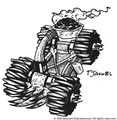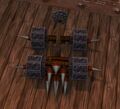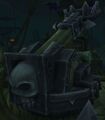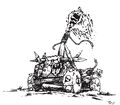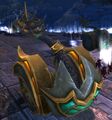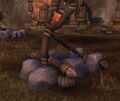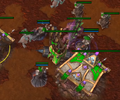Catapult
Catapults are siege weapons.
Orcish catapults
- Main article: Catapult (WC1 Orc)
Destruction and mayhem were its purpose, and those who were its target would reap only death. Chaos reigned supreme as the ground shook with the approach of these gruesome machines. Walls and buildings proved no barrier to the devastation of the orcish catapult. Although they were sluggish and huge, the orc forces would prove unstoppable when commanding these devices.[1]
- Main article: Catapult (Warcraft II)
Sharpened horns, crimson with blood of those unfortunate enough to be caught in their path, heralded the advance of the orcish Catapult. Approaching on the battlefield, its grim visage was enough to make the weak human troops flee in stark terror. These cumbersome, wheeled machines launched deadly incendiary shot which exploded upon impact. The sheer destructive force of these great engines of war made them feared and respected throughout the land.[2]
- Main article: Catapult (Warcraft III)
The orcish catapult has always been a standing asset to the Horde. Capable of hurling fiery projectiles over great distances, the catapults have been the doom of many Alliance regiments.[3] Catapults served as the Horde's greatest siege weapon until the advent of the demolisher.
Many destroyed orc catapults from the First War and the Second War can be seen all over Azeroth and Outland, one of them even being exhibited in the Ironforge museum. The Rageroar clan still makes use of the war machines.[4] Catapults were also used at the Forsaken Front in Silverpine Forest.
Under lady Sylvanas Windrunner leadership, orcish technology advanced to an extreme in which their newly built catapults became weapons of mass destruction. As seen during the beginning of the Fourth War, a few dozen of them were able to fire from hundreds of miles away in the coast of Darkshore, and burn down Teldrassil, a World Tree the size of an island, in mere hours.
Forsaken catapults
- Main article: Forsaken catapult
Catapults are used both as blight-spreaders and siege weapons by the Forsaken.
Human catapults
- Main article: Catapult (WC1 Human)
The catapult brought fiery death to all who stood in its way. Capable of destroying any target in its range, the projectile from a catapult could smash the toughest of defenses, or through the sides of buildings. This behemoth was large, slow, and difficult to maneuver, but the power that it held made it an essential part of Human forces during the First War.[5]
After the First War, humans favored the ballista instead which was a joint collaboration of the Alliance forces.
Dwarven catapults
Despite the many technological advances of the dwarves, like the siege tanks, some catapults are still used by the Wildhammer clan and the Earthen.
Mantid catapults
Types
- Horde Catapult - Ironforge
- Dragonmaw Catapult - Wetlands
- Wintergrasp Catapult - Wintergrasp

- Catapult - Isle of Conquest

- Forsaken Catapult - Gilneas

- Rageroar Catapult - Southern Barrens

- Earthen Catapult - Deepholm

- Refurbished Catapult - The Jade Forest

- Krik'thik Catapult - Dread Wastes

In the RPG
Catapults and trebuchets use a lever arm to hurl a projectile in an arcing ballistic trajectory toward their target, yet that simple mechanism is employed in many different manners on the battlefield.[6]
Spring catapults
A spring catapult lacks the axle used by many similar weapons and instead uses a windlass and pulley system to draw back its flexible lever arm. Once a projectile is mounted in the sling at the end of the arm, the arm is released to hurl the projectile at the target. Spring catapults are easy to construct and are often built from scratch by tinkers and engineers on the battlefield.[6]
Torsion catapults
The lever arm of a torsion catapult is mounted in an axle made of a twisted skein of leather or sinew. Once winched back into place, the basket on the end of the lever arm is loaded with a projectile that can be fired downrange.[6]
Siege catapults
A larger version of the torsion catapult, the siege catapult is made to hurl large payloads far behind the enemy's front lines.[6]
Toy catapults
Originally intended as a mass-produced siege weapon that could be carried in a soldier’s backpack, these catapults can be reduced to the size of a child’s toy upon command. Unfortunately, they proved too fragile and expensive to truly catch on. One orcish army drained its entire treasury to create a kind of “catapult cavalry” unit equipped with these tiny weapons, only to lose the whole unit (and their weapons) in a single ambush. Unaware of their true powers, the victorious opponents took the “toys” home to their children. No one is sure how many of these items are now scattered around the world, gathering dust on a child’s bedroom shelf. This is a shrinking spike stone siege catapult that effectively has the shrinking property twice. The siege weapon can be made to shrink to approximately a foot in size, enabling it to be easily packed away with its commander’s gear.[7]
Trivia
- Catapults also appear in Heroes of the Storm. They start appearing after a Keep is destroyed.
Gallery
Ogre catapult at Brute's Rise.
Catapult from Warbringers - Sylvanas.
Times Change catapult.
Bomb Flinger in Hearthstone.
References
- ^ Warcraft: Orcs & Humans manual, Orcish Horde of the First War, Catapult
- ^ Warcraft II: Tides of Darkness manual, Ground Units of the Orcish Horde, Catapult
- ^ Blizzard Entertainment. Warcraft III: Reign of Chaos Manual, 89.
- ^
 [10-30] Lifting the Siege
[10-30] Lifting the Siege
- ^ Warcraft: Orcs & Humans manual, Azeroth Army of the First War, Catapult
- ^ a b c d Alliance & Horde Compendium, pg. 122
- ^ Magic & Mayhem, pg. 128
| |||||
es:Catapulta



